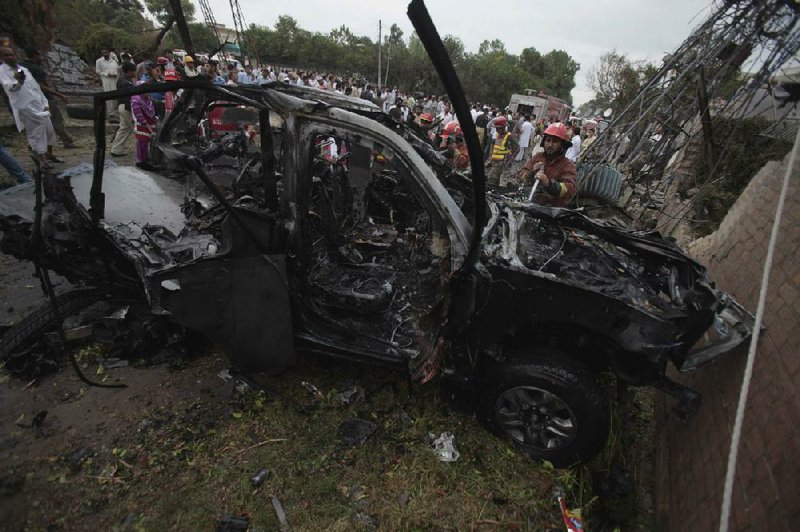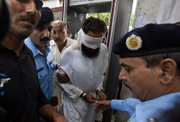PESHAWAR, Pakistan — A suicide car bomber rammed a U.S. government vehicle in the northwestern city of Peshawar on Monday, killing two Pakistanis and wounding more than a dozen - including two Americans - in one of the worst attacks against the U.S. in Pakistan in recent years, officials said.
INTERACTiVE
http://www.arkansas…">Read more on the protests in the Mid East
The bombing was a vivid reminder of the danger of operating in Pakistan, especially in the northwest, where Taliban and al-Qaida militants are strongest. The U.S. has persisted because its work in Pakistan is seen as key to countering militants who threaten American interests in neighboring Afghanistan and elsewhere.
Insurgents have carried out scores of bombings in Peshawar in recent years, but attacks against American targets have been relatively rare because of extensive security measures by the U.S. government - ones that diplomats sometimes complain limit their effectiveness and ability to move around.
The U.S. said it would review its security procedures after Monday’s attack, which was condemned by Secretary of State Hillary Rodham Clinton.
“We pray for the safe recovery of both American and Pakistani victims, and once again we deplore the cowardly act of suicide bombing and terrorism that has affected so many around the world,” Clinton said during a visit to Indonesia.
Clinton said it was still too early in the investigation of the attack to talk in detail. She did tell reporters that it “appears that a van filled with both American and Pakistani personnel, as well as locally employed staff at the embassy site, were targeted by a suicide bomber who drove a vehicle into this van with the consequence that there were injuries of both Pakistanis and Americans in [the vehicle] and on the ground.”
“It is deeply regrettable that there are those who pursue political goals through terrorism,” she said.
The armored sport utility vehicle from the U.S. Consulate in Peshawar was attacked as it traveled through a heavily guarded area of the city that hosts various international organizations, including the United Nations. It was unclear how the bomber penetrated the area and knew which vehicle to attack.
The car driven by the bomber was packed with 240 pounds of explosives, police said. The blast ripped apart the SUV - tossing its engine at least 20 feet away - and started a raging fire. Rescue workers and residents rushed to put out the fire and pull away the dead and wounded. All that was left of the SUV was a charred mass of twisted metal with a red diplomatic license plate.
The SUV’s driver, Atif Nawaz, said the blast knocked him out.
“When I came to my senses, I jumped out of my car and screamed, ‘What happened?’” said Nawaz, whose face and hands were badly burned.
The attack killed two Pakistanis and wounded 19 other people, including policemen who were protecting the Americans, said senior police officer Javed Khan.
Two Americans and two Pakistanis working at the U.S. Consulate in Peshawar were among the wounded, said State Department spokesman Victoria Nuland, who called the attack a “heinous act.”
The wounds to the Americans were not life-threatening, a U.S. Embassy official said on condition of anonymity because the information had not been officially released.
The charge d’affaires at the U.S. Embassy, Richard Hoagland, praised Pakistani security forces for saving the lives of the four consulate employees.
“In this dangerous world where terrorists can strike at any moment, we must all work together - Pakistanis and Americans alike - because we have a strong mutual interest in defeating terrorism,” he said.
No group has claimed responsibility for the attack, but suspicion will fall on Taliban and al-Qaida militants who have long had their sights set on the United States. American drones have fired scores of missiles at the militants’ hideouts in Pakistan in recent years, and Washington has given the Pakistani military billions of dollars to fight the extremists.
The worst recent attack on U.S. personnel in Pakistan was in 2010 when a suicide car bombing in the northwest area of Lower Dir killed three American soldiers who were training local forces.
A car bomb and grenade attack against the U.S. Consulate in Peshawar in April 2010 killed four Pakistanis, including three security personnel and a civilian. In August 2008, the top U.S. diplomat at the consulate survived a gun attack on her armored vehicle. Three months later, gunmen shot and killed an American in Peshawar as he was traveling to work for a U.S.-funded aid program.
Also Monday, lawyers defending a Pakistani Christian girl arrested under highly criticized blasphemy laws demanded she be freed after the detention of a local Islamic preacher who is accused of framing her.
Police took custody of Khalid Chishti, an Islamabad imam who had earlier testified against the girl, on Saturday after a member of his mosque accused him of placing pages of the Koran in texts she purportedly burned, defense lawyer Raja Ikram said Monday after a bail hearing was again postponed.
“After this new revelation, there is nothing left in the case,” Ikram told reporters after proceedings were delayed until Friday. “After the statement by a witness against Chishti, it is clear that the whole case is fabricated.”
The case of the girl, arrested last month in a slum neighborhood of the capital, surfaced as the Muslim nation debates blasphemy laws under which insulting the Muslim holy book or the Prophet Muhammad is punishable by a jail term or even death. Chishti denies the accusations against him, The Associated Press reported Monday, adding that police are probing whether he should now face a blasphemy charge.
Medical tests that suggest the girl is 14, with an even lower mental age, have been disputed by the prosecution. Christians in the vicinity fled their homes fearing attack.
The blasphemy law was passed in 1987 under the army rule of General Muhammad Zia ul-Haq as part of his policy of building a more explicitly Islamic state in Pakistan. While no one has been executed by the state under the law, killings over alleged blasphemy cases have included seven Christians amid riots in 2009 in Punjab province.
Information for this article was contributed by Matthew Lee of The Associated Press; and by Augustine Anthony of Bloomberg News.
Front Section, Pages 1 on 09/04/2012


